EN

Ensaio do grupo de teatro "Do Lado de Fora" © Inês Aleixo
Of all the things we possess, time is perhaps the most valuable asset. Irrecoverable, irreplaceable, time is measured in choices: how we use it and to whom we dedicate it. There are those who choose to offer it - without expecting anything in return (except smiles!) - to social and community causes and projects. This is the case of Isabel Mendes and Isabel Natário, volunteers at Nuvem Vitória and Coração na Rua, respectively, who use their time to make small changes in other people's lives, inspire the community and remind us that sharing is the most precious thing in humanity. This is also the case of Rui Spranger, artistic director at Apuro - Associação Cultural e Filantrópica and at the theatre group ‘Do Lado de Fora’, a project that promotes inclusion through art, whose members say they are ‘one big family’.
Translated with DeepL.com (free version)
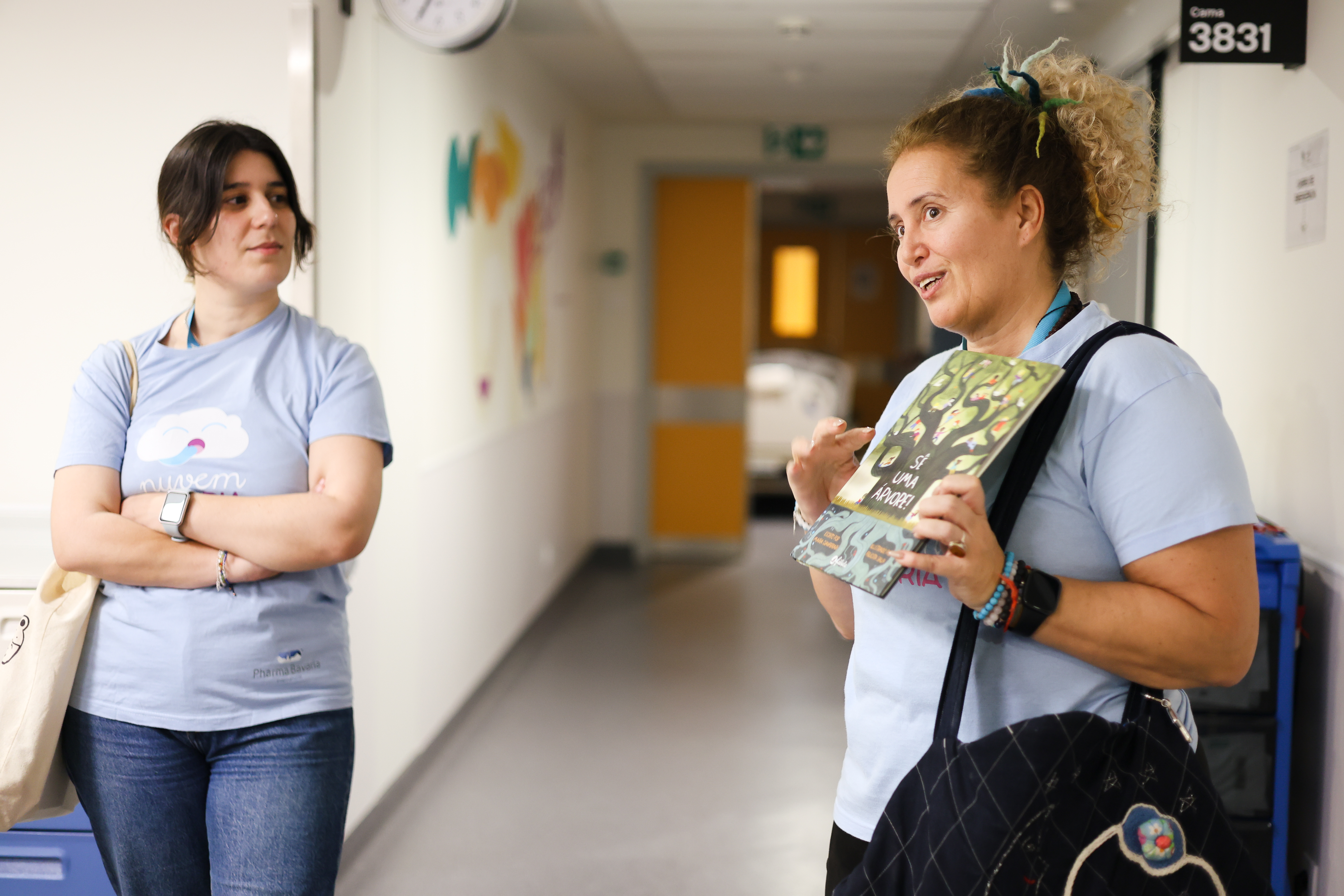
Estelle Gonçalves and Isabel Mendes of Nuvem Vitória © Inês Aleixo
Would you like to listen to a story?
Every night, between 8pm and 10pm, the children and young people in the paediatric unit of the Hospital de São João receive special visitors: volunteers from Nuvem Vitória who tell them bedtime stories. ‘Do the nurses also get a story today?’ jokingly asks a nurse to a team of eight volunteers who have just arrived and whom Agenda Porto accompanied. Among them is Isabel Mendes, who has been a volunteer for six years with this association that operates in 11 hospitals across the country, and which began its activity in Porto in 2017.
Isabel travelled about an hour from Paços de Ferreira to come and tell stories. A psychologist by training, she has worked for that municipality for 38 years, where she is responsible for the library's Education Service. It was ‘on a very foggy professional day’ that she opened her email box and read a message from a friend challenging her to join the association as a volunteer. ‘I was keen to volunteer, and I'd already had other offers to collaborate with other organisations, but I'd never felt the call,’ she says. When she read the project description, she decided to sign up. ‘I didn't hesitate, I went for it.’ After training, her first action, she recalls, was on 16 April 2018. When she started there were around 60 volunteers at ‘Joãozinho’ [paediatric unit]. Today there are 135.
In this volunteer project, the storytellers are scheduled according to their monthly availability, and work in pairs formed randomly by the internal platform. Each night, eight volunteers tour the surgery, burns and oncology units spread over the two floors of São João's paediatric ward; the pairs start at each end. Before they start their rounds, a briefing is held with the nurses on duty to find out about each patient's condition and assess the type of approach; they learn whether or not they should enter the wards (for example, if a child has just come out of chemotherapy treatment) or if there are situations that require them to dress up. ‘Let's dress up before I tell you a story,’ they joke with a little girl in isolation, who smiles.
Some children are already familiar with ‘the clouds’ and are anxiously awaiting their arrival. Some stand guard at the bedroom door waiting for their turn to hear a story. This is the case of eight-year-old Martim, who welcomes us with a mischievous smile. ‘If all goes well, I'll finish the antibiotic on Tuesday and leave on Wednesday,’ he tells us cheerfully.
Before interacting with the children, the pairs always ask the accompanying adults for permission, but Martim doesn't even wait for his mother's answer and promptly says ‘yes’. However, he has a special request: he doesn't want to hear stories, he wants to be told jokes. Margarida Soares, coordinator of Nuvem Vitória's Porto team, tells him some jokes and riddles with the help of a book she carries in her bag.
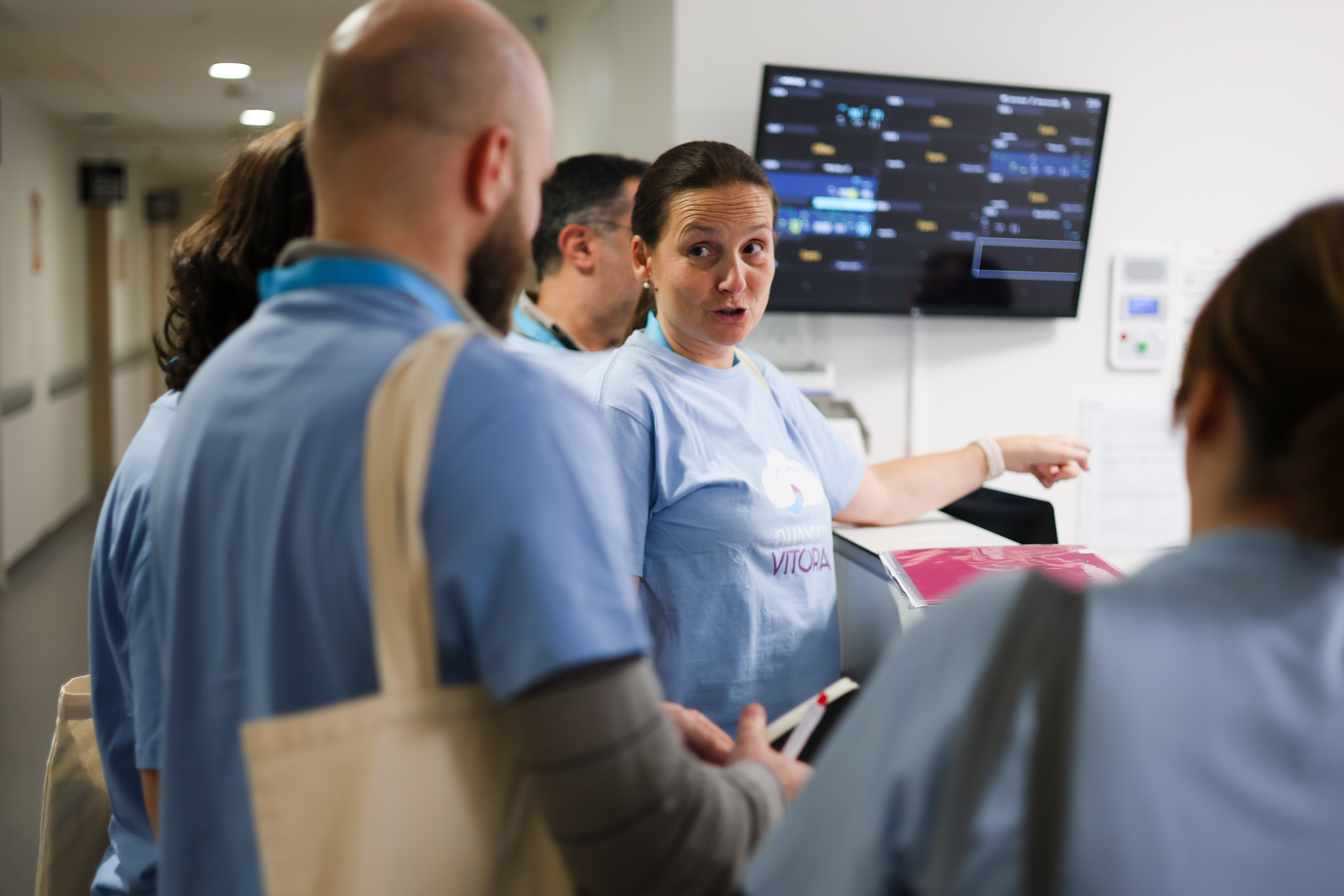
Briefing with Nuvem Vitória volunteers © Inês Aleixo
‘Stories change lives and can help us in many situations.’
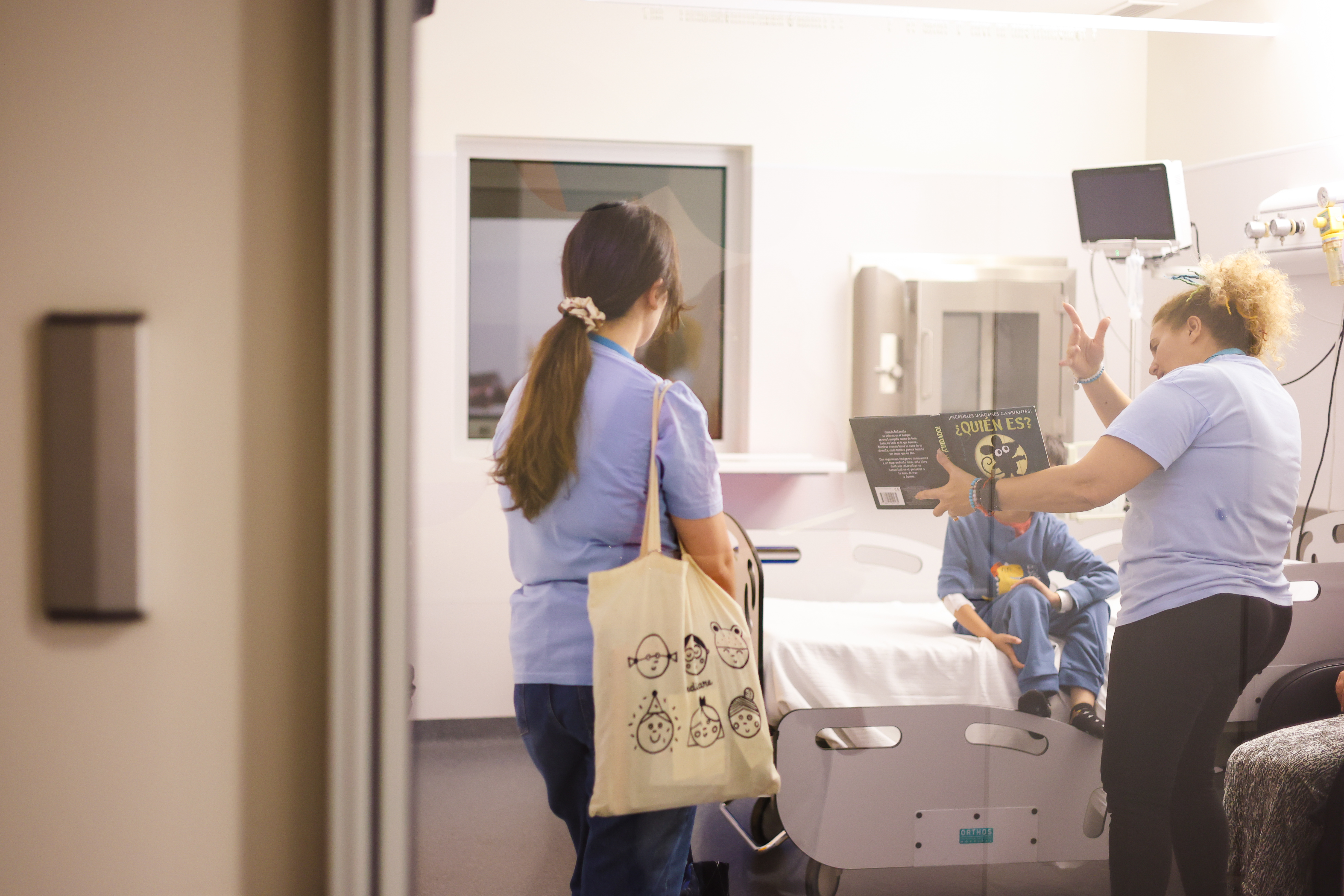
Isabel Mendes also always has a book of jokes and anecdotes in her bag because, she says, ‘it's effective’ in bringing smiles to the older children. A music box for babies and pop-up books for the little ones are other items she always carries with her.
According to Isabel, this voluntary service has made her ‘relativise life's problems’, and the most rewarding thing, she says, are ‘the smiles she takes home’. Not only from the children and young people, but also from the relatives who accompany them during their hospitalisation and who are moved by the stories she tells them. ‘We always have to be careful with the selection of stories we take, because we're dealing with vulnerable children, we don't take sad stories. Above all, we take stories of hope.’ And he defends: ‘Stories change lives, and they can help us in many situations’.’
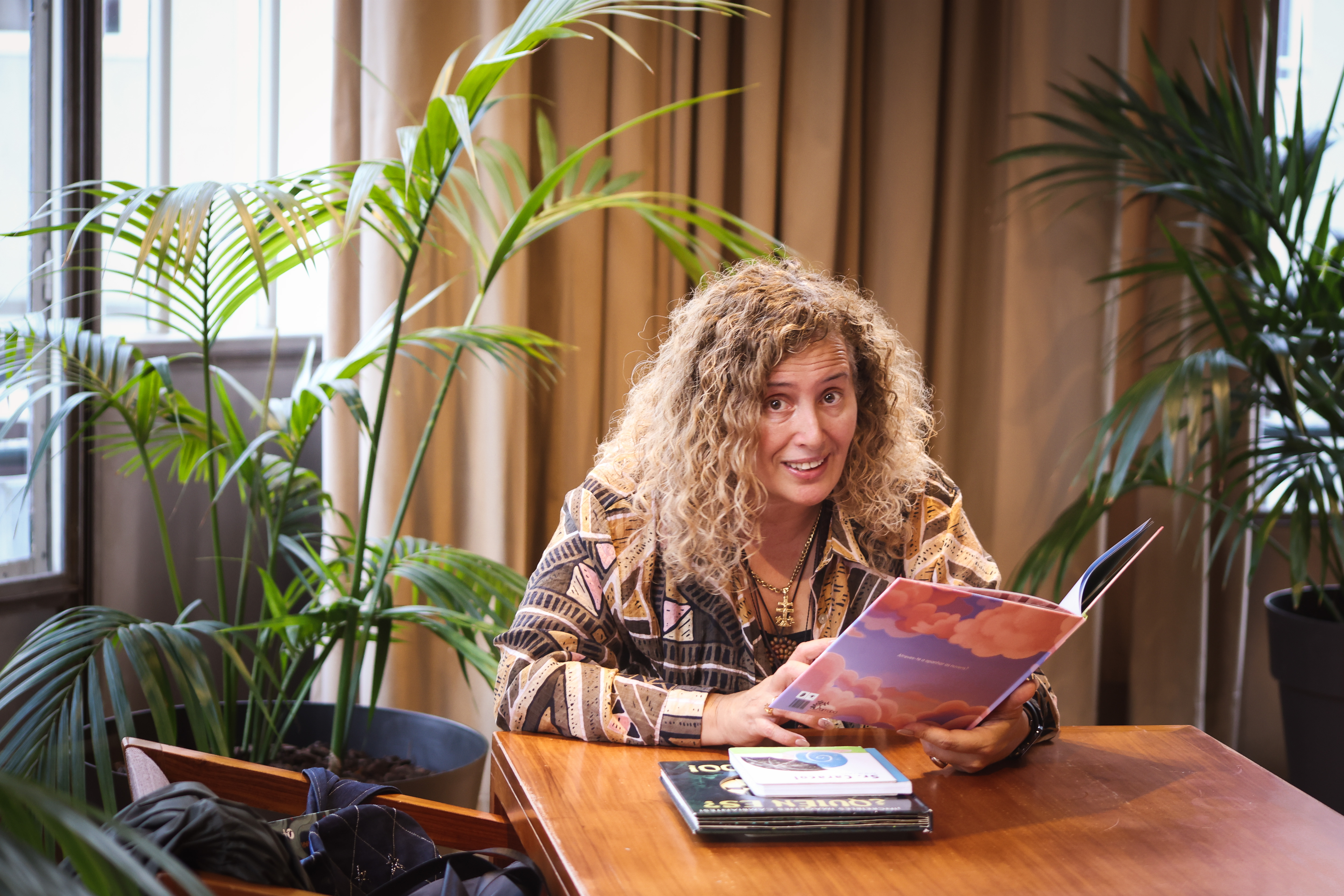
Isabel Mendes © Inês Aleixo
Her passion for storytelling and children's literature (which, she says, "is for everyone") led her to venture into writing. ‘The boy who wanted to catch the clouds’ is the title of her book. We asked her what volunteering means to her. "It means giving my time, and feeling that I always get more out of it than I give. I thought I didn't have time for anything, but it turns out that I do," she says. ‘I'm in the right place to do voluntary work."
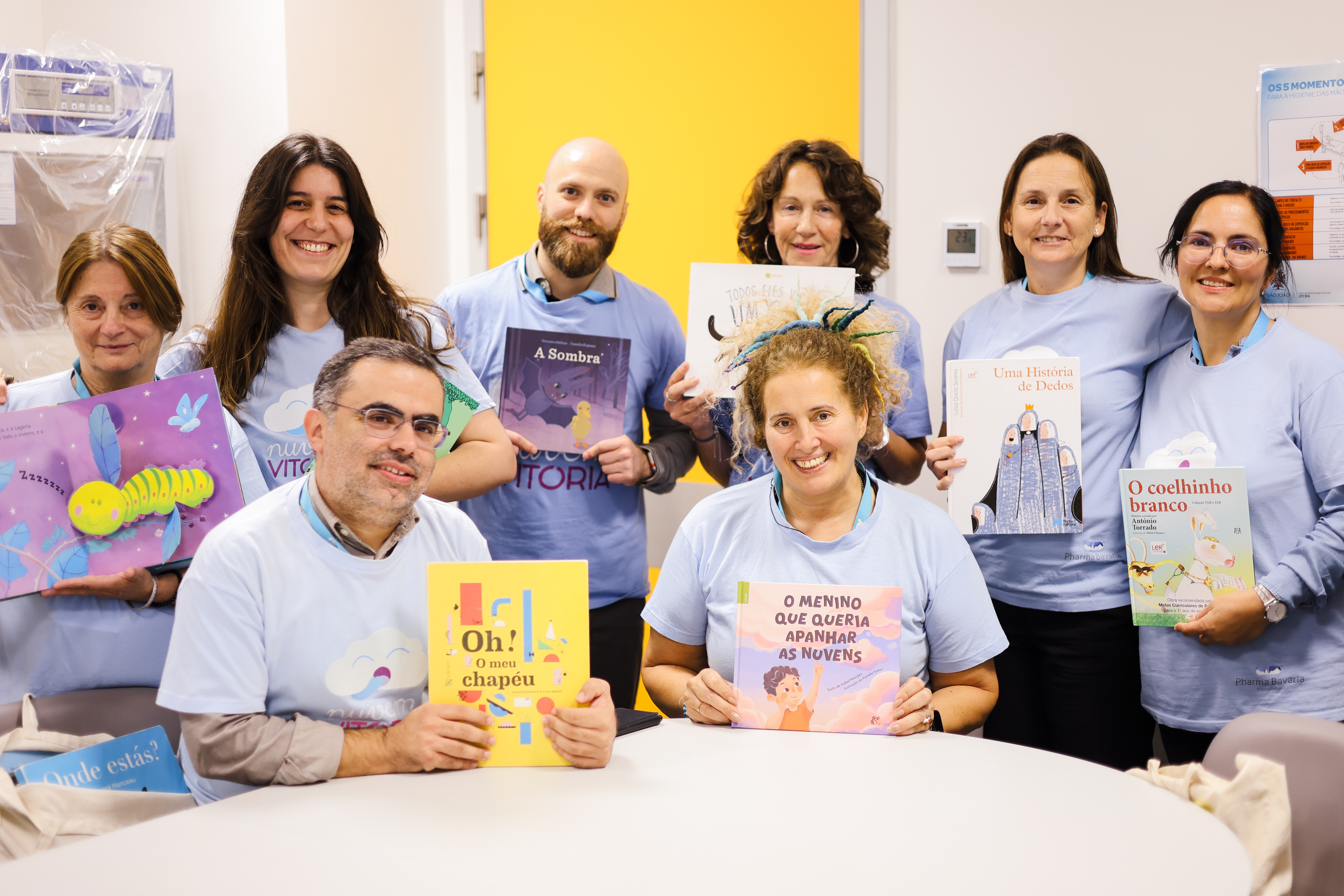
Volunteers of Nuvem Vitória © Inês Aleixo
Get to know more about Nuvem Vitória at nuvemvitoria.pt.
Hands are for sharing
Sharing is one of Isabel Natário's mottos. A kindergarten teacher at Agrupamento de Escolas Diogo de Macedo, in Gaia, she manages to find time to embrace various projects and causes. Helping others is, she says, ‘a very good addiction’. One of the projects she has been part of for three years is Coração na Rua, a solidarity association whose mission is to ‘make Porto's nights warmer, raise awareness and help those in need’.
We met Isabel at a street she knows well: Gonçalo Cristóvão is one of the places where this association provides support to people in vulnerable situations. Every fortnight on Saturdays, starting at 7.30pm, a group of volunteers offer a hot meal, food and other basic necessities to those most in need.
Volunteering came into her life almost three decades ago when she started collaborating with the EMAUS Movement. ‘I started sympathising with the causes,’ she says. At EMAUS, she came to be known as "a senhora das rabanadas" [‘the French toast lady’]. At Christmas, she would make around a hundred French toasts so that the institution's users could have this delicacy on their Christmas table. This is ‘a tradition’ that she has endeavoured to maintain over the years, and every Christmas she continues to make French toasts for the users of EMAUS and now also for the users of Coração na Rua.
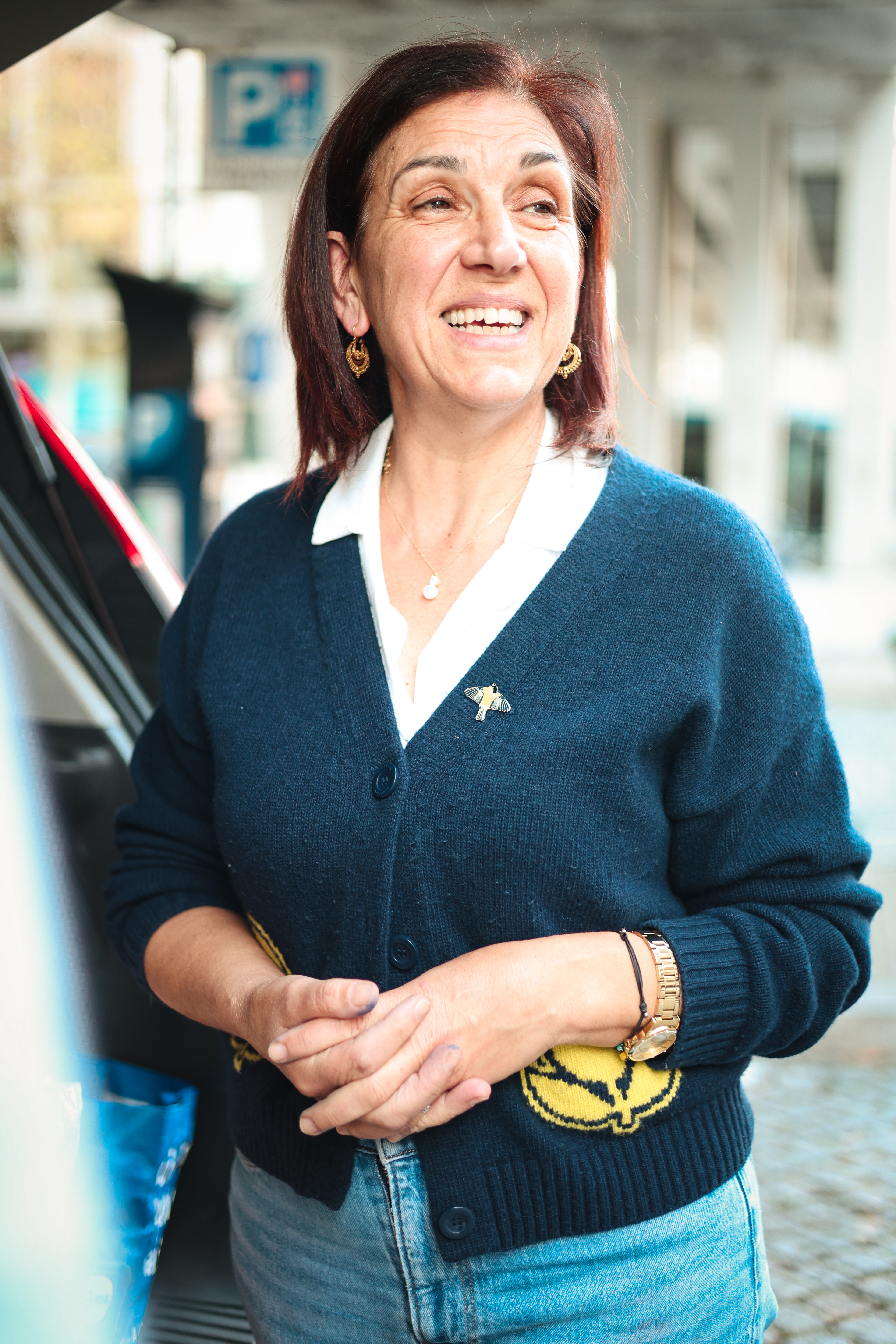
Isabel Natário © Inês Aleixo
On Saturdays when it is operating outside, Coração na Rua divides into two teams; one will distribute a meal and ‘a next day kit’ to around 45 people who are spread out ‘all over the city’. This team ‘makes a big round trip’ to reach these people ‘who don't leave their little square, the area where they live’. The team based in Gonçalo Cristóvão provides support to more than half a hundred homeless people, but also to ‘elderly people whose pensions aren't enough, who sleep in little rooms or have their own house, but are alone and have no family’. This volunteer says that the number of people seeking help from Coração na Rua has been increasing, ‘and they are mainly migrants; many Moroccans, Algerians and Tunisians’.
It was on one of Coração da Rua's nightly rounds, in October last year, that she met two of the seven Moroccan immigrants she helped ‘get off the street’ and who now call her ‘mum’. That's why Isabel is moved to tell this ‘very beautiful story’ of which she is very proud: ‘One night when the weather was very bad, they turned up here, all wet, asking for a place to sleep. We tried hostels, but there were no vacancies, so they ended up sleeping in Campanhã. In the meantime, they met up with two other friends with whom they had been in another European country, where they worked on farms, but because of a search they had to flee, and they found themselves here again.’
Isabel and her husband, ‘with the help of many friends’, managed to pay for their accommodation for a month in a hostel in Rua 31 de Janeiro. ‘I used to joke: “I've never lived in Porto and you can say that you have”,’ she says, laughing. In the meantime, they moved to Gaia and Isabel managed to find them a job in a construction company. The four of them were joined by three more: ‘There are lots of people who take advantage of them, with false contracts, and they are exploited and cheated.’ Today, they all have work and rental contracts and in November they started a Portuguese course.
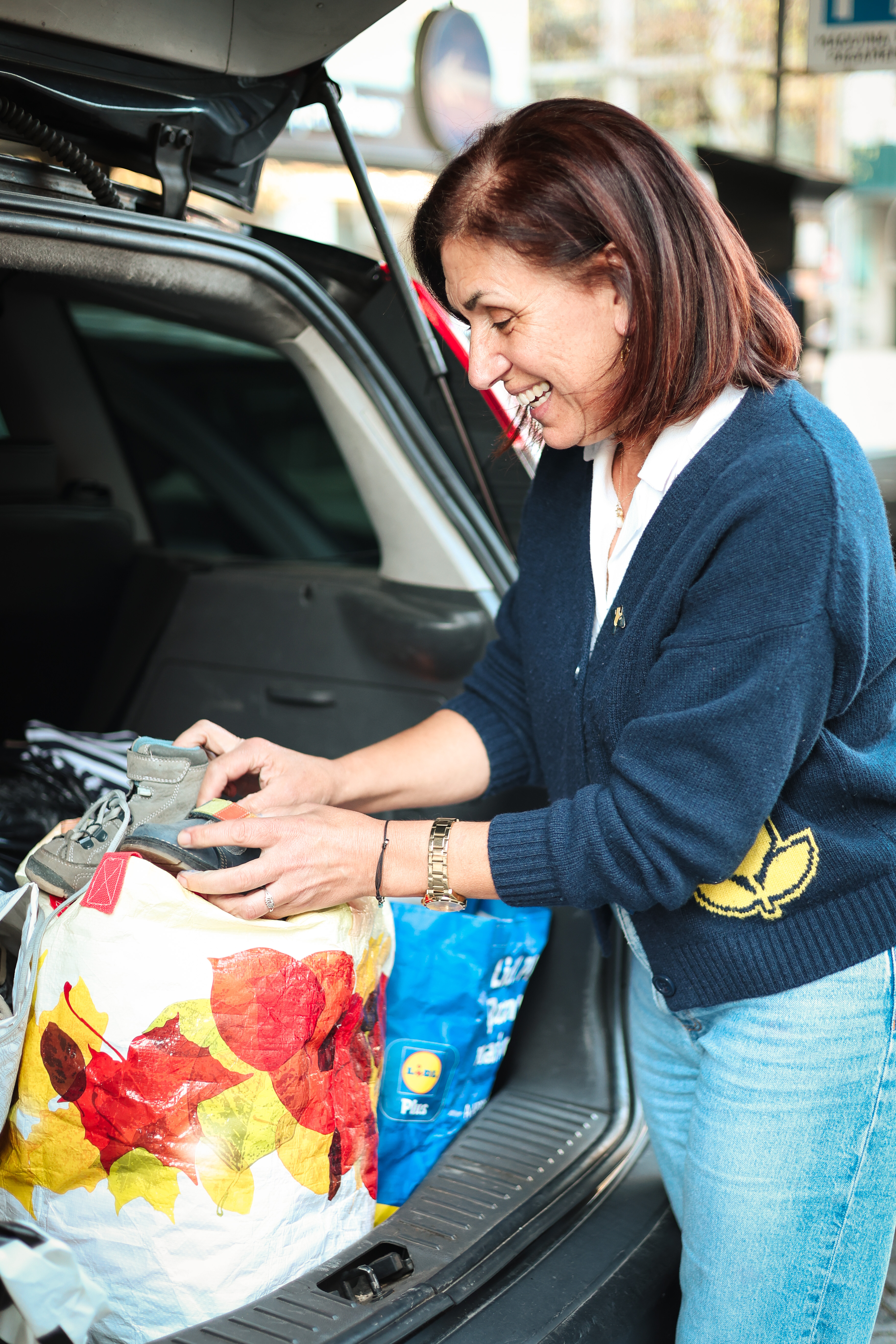
Isabel Natário © Inês Aleixo
‘Helping is easy’
Isabel opens the trunk, which is full of clothes and shoes that will soon have new owners. ‘These clothes come from everywhere, from colleagues who work with me at school,’ she says. The baby and children's clothes will be donated to Lar Luísa Canavarro - Comunidade de Inserção, an educational institution that takes in teenagers and young pregnant women or mothers with their children in vulnerable situations. Through pass-the-word, this volunteer says she manages to mobilise a large number of people to support her causes, creating real chains of mutual help. ‘The funniest thing is that it creates such a special network, helping is easy,’ she says.
As well as social causes, Isabel also embraces environmental ones. As a kindergarten teacher, she works with children on issues related to nature conservation, and ended up taking an interest in the priolo, a bird endemic to the Azores, which was once at risk of extinction. Through various initiatives with her pupils, she has contributed to the campaign to preserve this small bird, but also the blue shark, an endangered species which, thanks to various actions, is no longer served in Gaia school canteens. ‘This is what we have to sow in the little ones,’ she emphasises.
‘We're just ‘a drop in the ocean’, but a drop with another drop and another drop makes a tide pool where biodiversity is possible (...) and we really start to change things,’ she says. ‘The important thing is to care about others and not just be distressed by the bad things that happen. We can try to do something so that things really change; it may be a small thing, but it can make a difference,’ she says.
Get to know more about Coração na Rua at coracaonarua.pt.
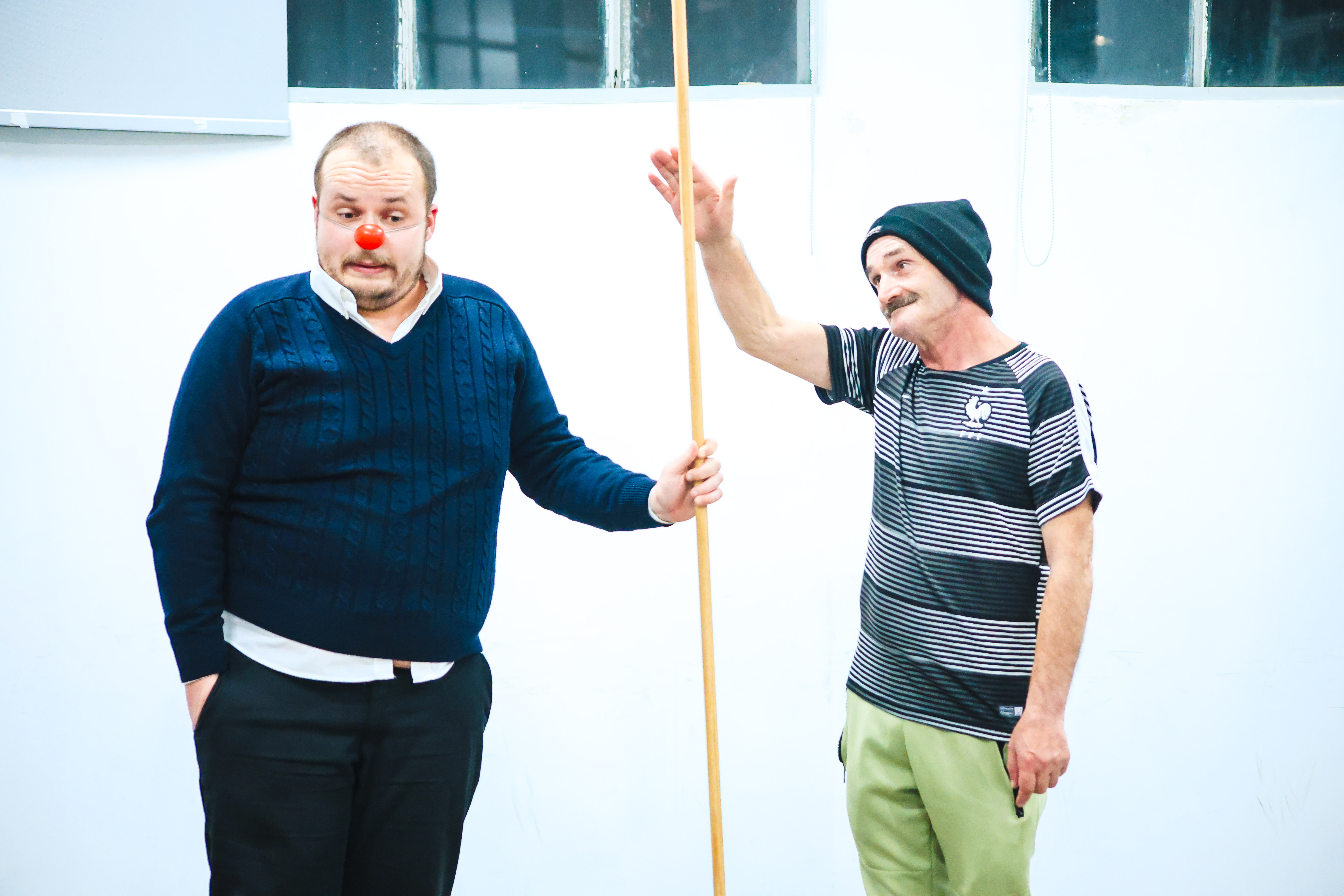
Tiago Ribeiro and Emílio Costa © Inês Aleixo
“Do Lado de Fora” ["From the Outside"]
Changing lives through theatre
‘We know we're going to make mistakes, we're not professional actors, but there's always someone who helps out, and that makes this not just a company; we're a family.’ Emílio Costa has been part of the ‘Do Lado de Fora’ theatre group since it was created in December 2022. It is a project of the cultural and philanthropic association Apuro that continues a project of integration through art, focussed on people experiencing homelessness and social exclusion.
On Mondays and Tuesdays, between 6pm and 8pm, ‘Do Lado de Fora’ rehearses at Casa D'Artes do Bonfim. Agenda Porto went to watch a rehearsal of the show that will premiere next year, and spent the break chatting to the group.
Rehearsals used to take place between 3pm and 5pm, but it was necessary to change the timetable because, in the meantime, ‘there have been people here who have started to join the labour market’. ‘Now, we've also lost an element that was great, because he's got a job and has a schedule that doesn't allow it; that would mean we'd be moving rehearsals too far into the evening,’ explains artistic director Rui Spranger.
‘When it comes to rehearsal day, I'm always worried about being on time,’ admits Emílio. ‘I'm taking it seriously, but I haven't been able to keep up with them. I don't have theatre training; I have street training,’ he says. ‘I'll say it all in two words: theatre and this company have changed my life. Because of Apuro, I'm a different human being; for example, I wouldn't give up my seat to anyone on the bus or metro, and today I'm the first to do so, thanks to what I've learned as a human being here at the theatre.’
With several shows under his belt, he is keen to point out the changes the theatre has brought them: ‘When this project started, hardly anyone worked. Today, I'm the only crook here, the others are training or working,’ he says with a sly smile. Everyone laughs. ‘The important thing here is that their self-esteem is all up, practically all of them are working or training,’ he emphasises.
Vilma, who has also been with the group since its initial formation, agrees: ‘Theatre has raised my self-esteem, and thanks to theatre I can say that I got a job, because I was a very shy person, and it's a way of expressing myself. I was ashamed of myself and of exposing myself at a job interview.’
Maria Alice, one of the most recent members, emphasises the creation of ‘bonds of friendship and affection’. ‘I'm recovering from a psychological situation, but I feel the strength to find a different path; I'm enjoying learning techniques that help me get to know myself and structure myself as a person.’
Joana, 25, the youngest member, says she has always been ‘very ashamed’. ‘In ‘Do Lado de Fora’ I'm not ashamed to be me and I think that's the starting point to be something else, to do theatre, which I've always wanted to do,’ she says.
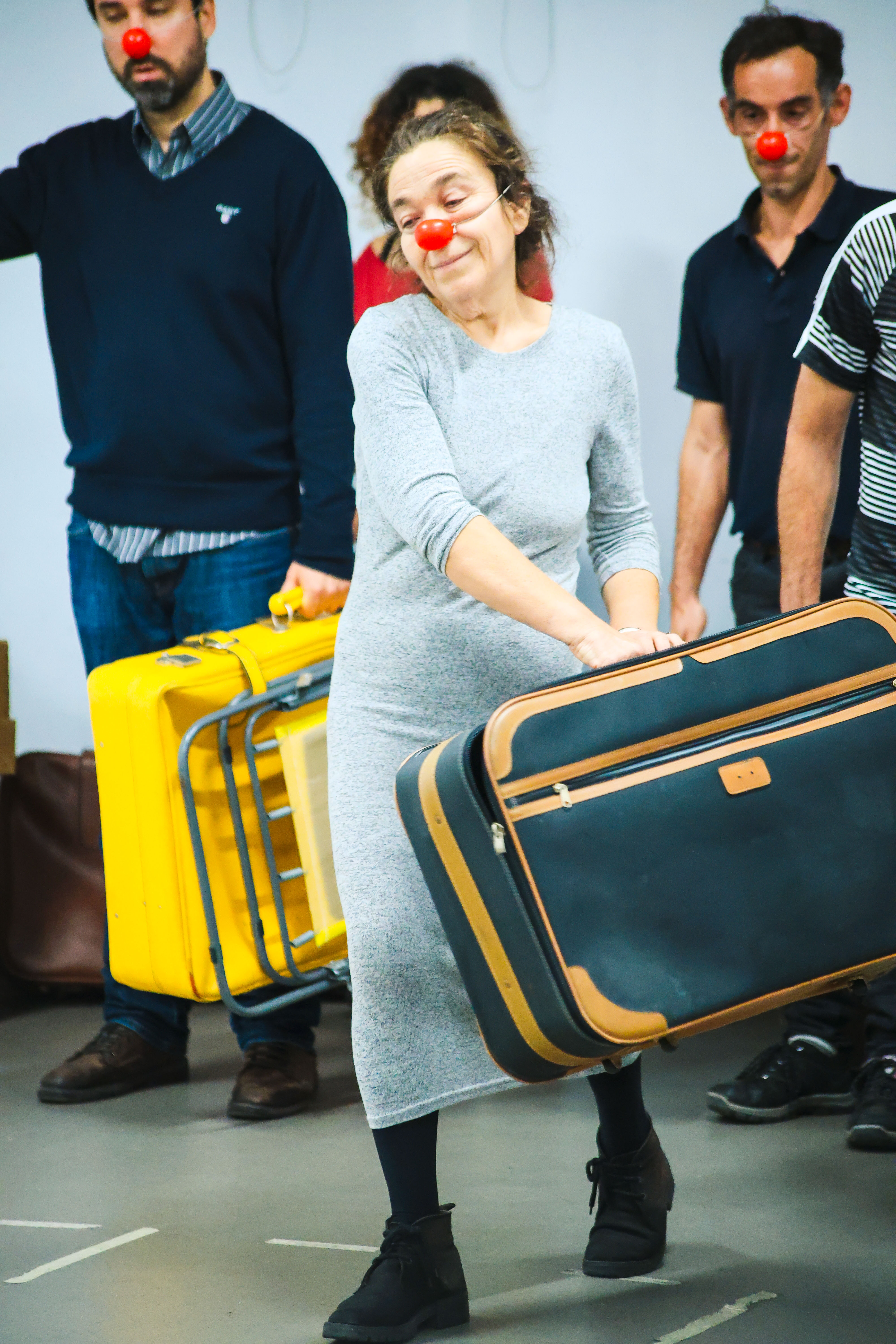
Maria Alice © Inês Aleixo
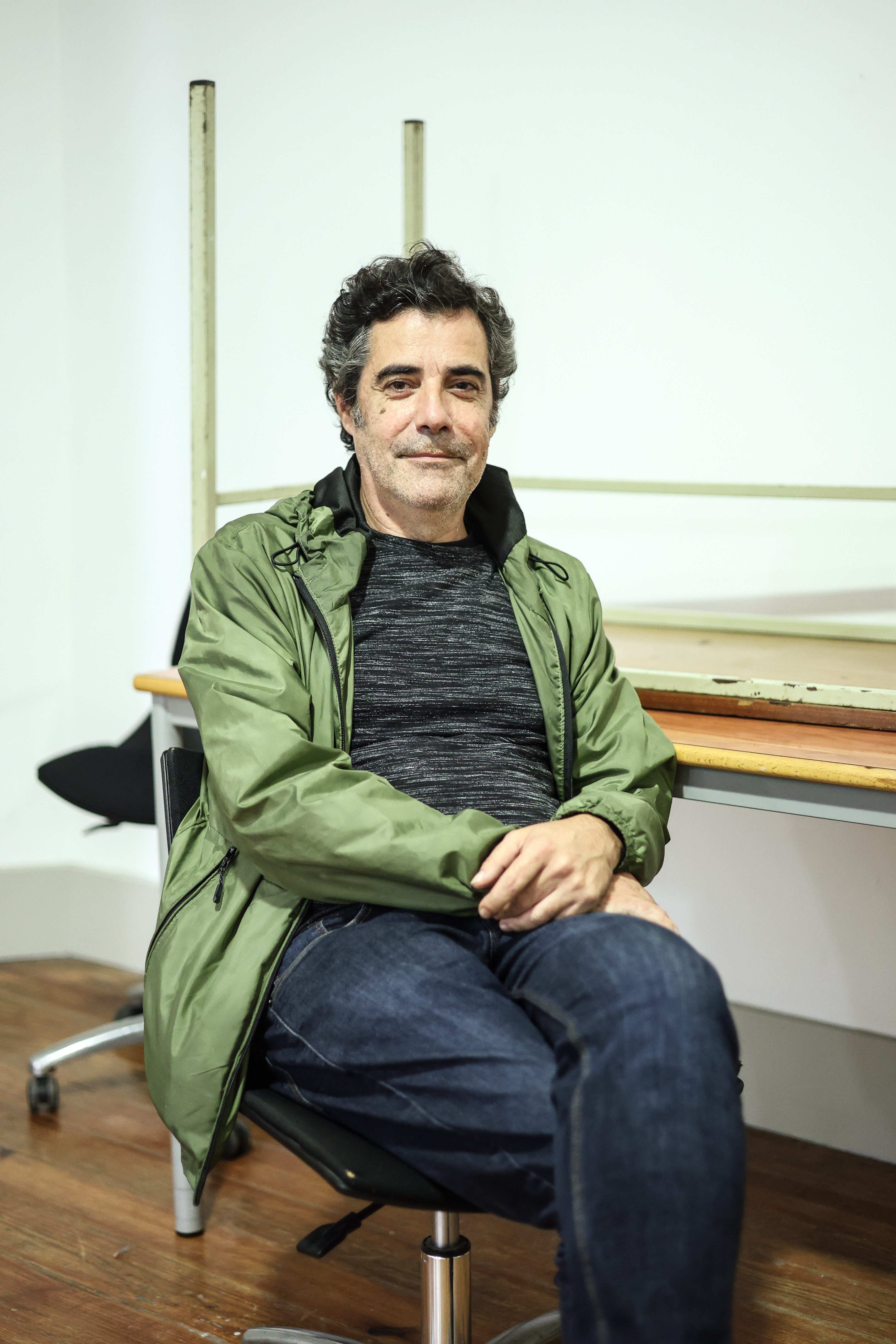
Rui Spranger, artistic director of Apuro © Inês Aleixo
Integration through art
Culture and solidarity ‘have always been at the core’ of Apuro, an association that ‘emerged during the crisis of 2009, although it only began operating in 2013, with the aim of supporting intermittent performers,’ says Rui Spranger. Since then, it has been working with homeless people through its participation in the ‘Voices of Silence’ platform and in ‘Axis 4 - Participation and Citizenship’ of the Homeless Planning and Intervention Centres (NPISA) in Porto.
It could be said that the genesis of ‘Do Lado de Fora’ was the SOmOS project, run by Porto City Council as part of the AIIA programme - Integrated Approaches for Active Inclusion, aimed at the homeless population and people in situations of social vulnerability, which was artistically coordinated by Apuro. The project consisted of three artistic creation workshops, each lasting four months, involving the Saber Compreender and PELE associations. These workshops resulted in a final show, entitled ‘É!’, which premiered successfully in June 2022 at Teatro Campo Alegre, and which gave rise six months later to the ‘Do Lado de Fora’ theatre group.
It was ‘a biodrama and documentary theatre show,’ says Spranger. ‘We were interested in working on the dreams of childhood and the dreams of now, we were interested in the positive and negative sides of social assistance; it's a show about fighting stigma and a show about humanisation,’ he says. He continues: ‘Here, we have the concept of working outwards and working inwards. Now we're working inwards, from this perspective in which we have a greater artistic challenge with this show, in which we're working on physical theatre and clown.’
‘Do Lado de Fora’ is a collective open to everyone. ‘Anyone can join,’ emphasises the artistic director. This was the case with Tiago Ribeiro, a young actor and director who participates voluntarily in the group, having even challenged some members to take part in the show ‘Isto não é um show’, by the cultural association Formiga no Casulo, which was on stage in November at the Helena Sá e Costa Theatre.
As a newcomer to ‘Do Lado de Fora’, Tiago says he ‘felt I had a lot to learn from them, more to learn than to teach’. ‘I had the theatre side and lacked a bit of life, and these people have that. What happens on stage is just the translation of all the years they have behind them,’ he says.
Maria Alice takes the opportunity to say that, for her, theatre ‘works a lot like therapy, although she has professional help’, pointing out that the work Tiago has done with the group has been ‘very therapeutic’.
The premiere of the next show is scheduled for 20 February, at Teatro Campo Alegre, and has the support of Porto City Council and the Bonfim Parish Council.
‘‘Do Lado de Fora’ comes from a desire of ours. We've been working for over a year without funding, which only came this year, so there's a lot of voluntary labour,’ says the artistic director. ‘We're at risk of not having funding from March next year, but we'll keep working. There's a will to continue regardless of the conditions.’
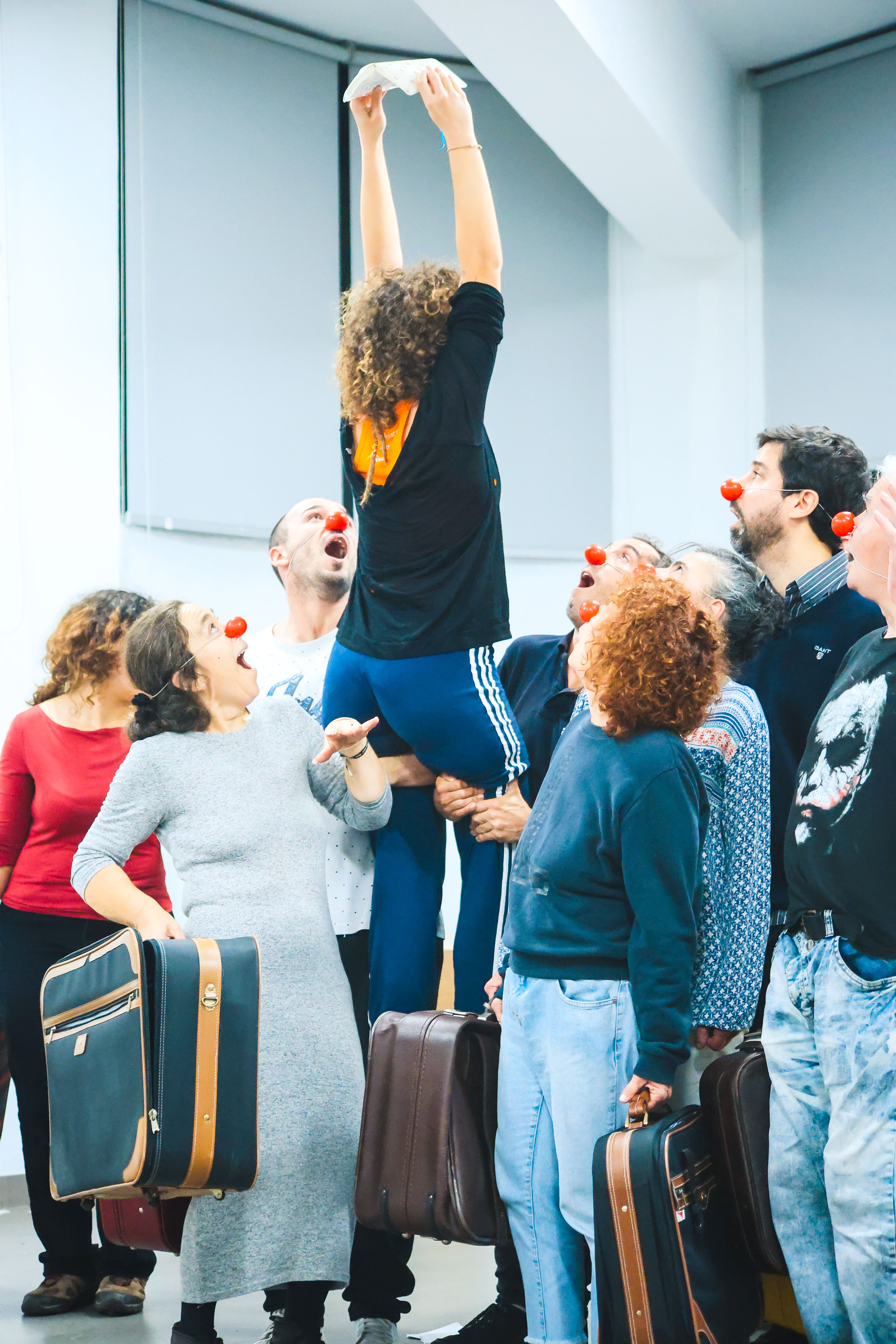
"Do Lado de Fora" © Inês Aleixo
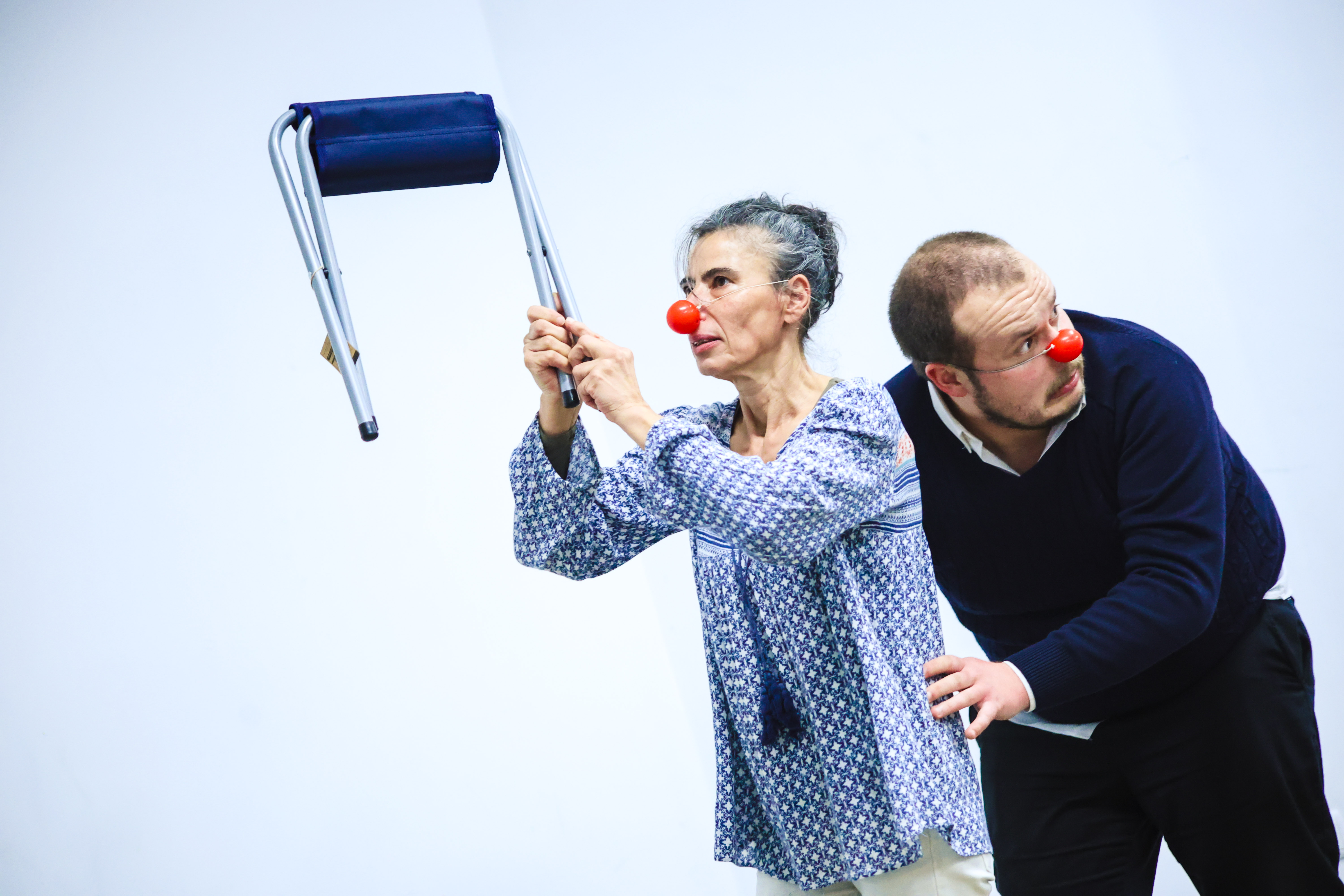
Get to know more about “Do Lado de Fora” at apuro.pt
by Gina Macedo
Share
FB
X
WA
LINK
Relacionados


